

Spencer Dale, Executive Director & Chief Economist. Spencer Dale is Executive Director and Chief Economist at the Bank of England, having been appointed to this position on 1 July 2008.
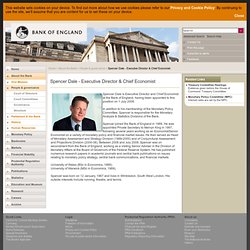
In addition to his membership of the Monetary Policy Committee, Spencer is responsible for the Monetary Analysis & Statistics Divisions of the Bank. Spencer joined the Bank of England in 1989. He was appointed Private Secretary to Mervyn King in 1997, following several years working as an Economist/Senior Economist on a variety of monetary policy and financial market issues. He then served as Head of Monetary Assessment and Strategy Division (1999-2000) and of Conjunctural Assessment and Projections Division (2000-06). Between 2006 and July 2008, Spencer was on secondment from the Bank of England, working as a visiting Senior Adviser in the Division of Monetary Affairs at the Board of Governors of the Federal Reserve System. Monetary Policy Committee (MPC) Interest rates are set by the Bank’s Monetary Policy Committee.
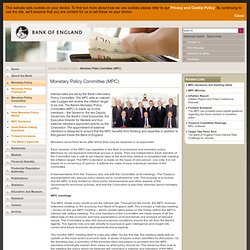
The MPC sets an interest rate it judges will enable the inflation target to be met. The Bank's Monetary Policy Committee (MPC) is made up of nine members – the Governor, the two Deputy Governors, the Bank's Chief Economist, the Executive Director for Markets and four external members appointed directly by the Chancellor. The appointment of external members is designed to ensure that the MPC benefits from thinking and expertise in addition to that gained inside the Bank of England. Adam Posen - Wiki. Adam S.
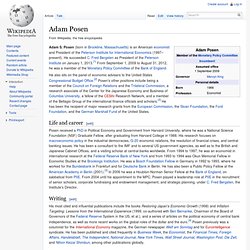
Posen (born in Brookline, Massachusetts) is an American economist and President of the Peterson Institute for International Economics (1997–present). He succeeded C. Fred Bergsten as President of the Peterson Institute on January 1, 2013.[1] From September 1, 2009 to August 31, 2012, he was a member of the Monetary Policy Committee of the Bank of England. Named and unnamed shareholders of the Bank of England - a Freedom of Information request to Her Majesty’s Treasury. BANK OF ENGLAND (SHAREHOLDERS). (Hansard, 6 May 1941) UK Debt Management Office. Bank of England Base Rates. This graph shows the Bank of England Base Rates Since 1970.
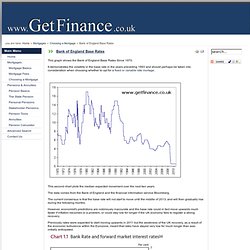
It demonstrates the volatility in the base rate in the years preceding 1993 and should perhaps be taken into consideration when choosing whether to opt for a fixed or variable rate mortage. This second chart plots the median expected movement over the next two years. The data comes from the Bank of England and the financial information service Bloomberg. The current consensus is that the base rate will not start to move until the middle of 2013, and will then gradually rise during the following months. However, economist's predictions are notoriously inaccurate and the base rate could in fact move upwards much faster if inflation becomes or a problem, or could stay low for longer if the UK economy fails to register a strong recovery.
Home. Mervyn King (economist) - Wiki. Mervyn Allister King, Baron King of Lothbury, GBE FBA (born 30 March 1948) was the Governor of the Bank of England and Chairman of its Monetary Policy Committee from 2003 to 2013.
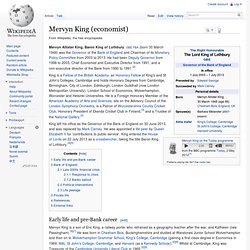
He had been Deputy Governor from 1998 to 2003, Chief Economist and Executive Director from 1991, and a non-executive director of the Bank from 1990 to 1991.[2] King is a Fellow of the British Academy, an Honorary Fellow of King's and St John's Colleges, Cambridge and holds Honorary Degrees from Cambridge, Birmingham, City of London, Edinburgh, London Guildhall (now London Metropolitan University), London School of Economics, Wolverhampton, Worcester and Helsinki Universities. Bank of England - Wiki. The Bank of England, formally the Governor and Company of the Bank of England, is the central bank of the United Kingdom and the model on which most modern central banks have been based.
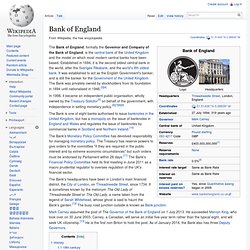
Established in 1694, it is the second oldest central bank in the world, after the Sveriges Riksbank, and the world's 8th oldest bank. It was established to act as the English Government's banker, and is still the banker for the Government of the United Kingdom. The Bank was privately owned by stockholders from its foundation in 1694 until nationalised in 1946.[3][4] In 1998, it became an independent public organisation, wholly owned by the Treasury Solicitor[5] on behalf of the government, with independence in setting monetary policy.[6][7][8][9]
UK Debt Management Office. The United Kingdom Debt Management Office (DMO) is an Executive Agency of HM Treasury.
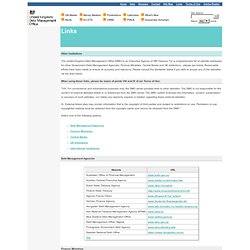
For a comprehensive list of website addresses for other Government Debt Management Agencies, Finance Ministries, Central Banks and UK institutions - please see below. Reasonable efforts have been made to ensure its accuracy and relevancy. Please consult the disclaimer below if you wish to access any of the websites via the links below . When using these links, please be aware of points VIII and IX of our Terms of Use:
U.K. BANKZ. HM TREASURY. Annual Report and Accounts. Central bank - Wiki. The primary function of a central bank is to manage the nation's money supply (monetary policy), through active duties such as managing interest rates, setting the reserve requirement, and acting as a lender of last resort to the banking sector during times of bank insolvency or financial crisis.
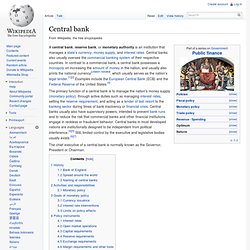
Central banks usually also have supervisory powers, intended to prevent bank runs and to reduce the risk that commercial banks and other financial institutions engage in reckless or fraudulent behavior. Central banks in most developed nations are institutionally designed to be independent from political interference.[4][5] Still, limited control by the executive and legislative bodies usually exists.[6][7] The chief executive of a central bank is normally known as the Governor, President or Chairman. History[edit] Prior to the 17th century most money was commodity money, typically gold or silver. Official bank rate - Wiki. Bank of England court worried about Mervyn King's politicised role. Giving evidence to the Treasury Select Committee on Tuesday, Sir Roger Carr, a member of the court and former chairman of Cadbury, said it was important that Mervyn King was not drawn into politics.
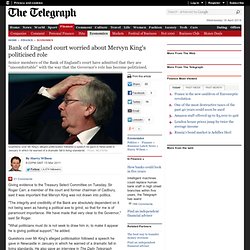
"The integrity and credibility of the Bank are absolutely dependent on it not being seen as having a political axe to grind, so that for me is of paramount importance. We have made that very clear to the Governor," said Sir Roger. "What politicians must do is not seek to draw him in, to make it appear he is giving political support," he added. Sir David Lees, chairman of the court and the former chairman of Tate & Lyle, said he was "not terribly comfortable" with the comments made by Mr King in his Newcastle speech. Bank of England injects further £75bn into economy.
6 October 2011Last updated at 15:11 The governor of the Bank of England, Mervyn King, tells the BBC that quantitative easing will have an effect The Bank of England has said it will inject a further £75bn into the economy through quantitative easing (QE).
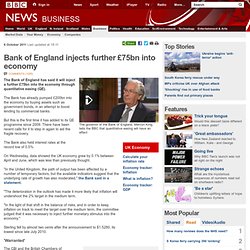
The Bank has already pumped £200bn into the economy by buying assets such as government bonds, in an attempt to boost lending by commercial banks.